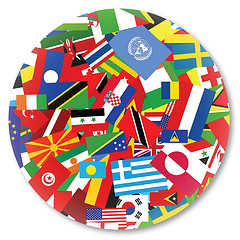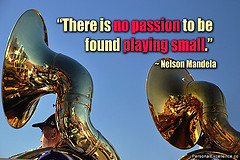I doubt Nelson Mandela ever thought of himself as a psychologist or as someone who made comments that are relevant about performance anxiety.
Following his recent death, when reading many news accounts about his remarkable life and his attitudes, I came to think of him as someone who not only had much to say about prejudice, oppression, and forgiveness but also expressed attitudes that are very psychological and pertinent for those people who struggle with an internal enemy called stage fright.
In my last blog, I wrote about how performance anxious people tend to project their worst fears about themselves onto the audience who then is experienced as a critic and harsh judge – ready to dish out dreaded punishments of criticism, disapproval, and rejection. Yet if we think about this further, we realize that we are our own harshest critics. Regrettably, too often, we are not our own most supportive fans. The performance anxiety enemy is “us”. An important step toward coping with performance anxiety is to discover and heal what we fear is the worst in ourselves.
I read in a newspaper article where Nelson Mandela was quoted as saying,
 “If you want to make peace with your enemy, you have to work with your enemy. Then he becomes your partner.”
“If you want to make peace with your enemy, you have to work with your enemy. Then he becomes your partner.”
I immediately had the thought he could have been speaking to performance anxious people. When we make peace with our fears and ourselves and learn to appreciate our strengths – and tolerate our limitations – we are on the way to making partners with performance anxiety. It no longer has the strength to be our emotional enemy and becomes our emotional energy.
Another quote by Nelson Mandela made me pause to consider its psychological implication about performance anxiety. So many of the performance anxious people I work with in my office talk about feeling inadequate. Yet beneath this fear lurks the opposite – they disavow or minimize being very capable. Many of these folks have the talent and capacity for success if they could deal with their internal “enemies”.
Several attitudes seem to impede success for some people. These may include the notion that to succeed robs others of success – to be a winner means someone else is a loser. This can induce guilt in and a need for self-punishment for people who feel guilty about succeeding. Self-punishment includes performance anxiety and undermining one’s performance in public.
Some people I have worked with feel greedy if they are successful. For a variety of reasons, they feel undeserving of the good things in life, including performing well and enjoying it. One person I worked with felt that performing meant getting too much attention. This person believed that her parents got a divorce because she showed off too much as a precocious child and grew up with magic thinking that this precipitated the breakdown of their marriage. As an adult, appearing in public revived her self-“diagnosis” of causing her parents’ separation and leaving her. Then she felt guilty. Of course, this was not the case, but for young children, magic thinking is not unusual as their minds and bodies are in a stage of psychological and physical development. Unfortunately, the magic thinking of the young child can persist into adulthood. Who among us hasn’t filled gaps in how we understand the world with incorrect “answers” when we don’t know pertinent information?
None of these feelings I have mentioned is experienced on a conscious level, but they can affect the performer nevertheless. Unproductive ideas and childhood thinking can be discovered and worked through with professional help. I believe Mr. Mandela spoke to the fear of success when he said
 “Our deepest fear is not that we are inadequate. Our deepest fear is that we are powerful beyond measure. It is our light, not our darkness, that most frightens us. Your playing small does not serve the world. There is nothing enlightened about shrinking so that other people won’t feel insecure around you. We are all meant to shine as children do. It’s not just in some of us; it is in everyone. And as we let our own lights shine, we unconsciously give other people permission to do the same. As we are liberated from our own fear, our presence automatically liberates others.”
“Our deepest fear is not that we are inadequate. Our deepest fear is that we are powerful beyond measure. It is our light, not our darkness, that most frightens us. Your playing small does not serve the world. There is nothing enlightened about shrinking so that other people won’t feel insecure around you. We are all meant to shine as children do. It’s not just in some of us; it is in everyone. And as we let our own lights shine, we unconsciously give other people permission to do the same. As we are liberated from our own fear, our presence automatically liberates others.”
I hope you realize as you read my blogs that there is more to performance anxiety than meets the (conscious) eye. I also hope you, like me, are inspired by Nelson Mandela’s beliefs about the dignity and worthiness within each one of us – on or off stage.
Title photo by mrgarethm
Text photo 1 by celestinechua
Test photo 2 by olga-lednichenko

